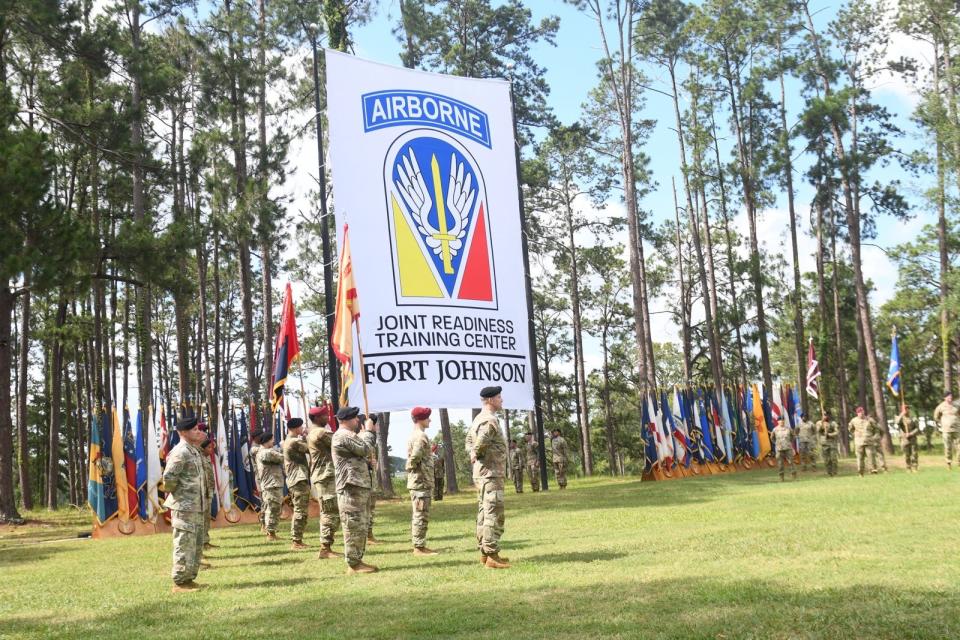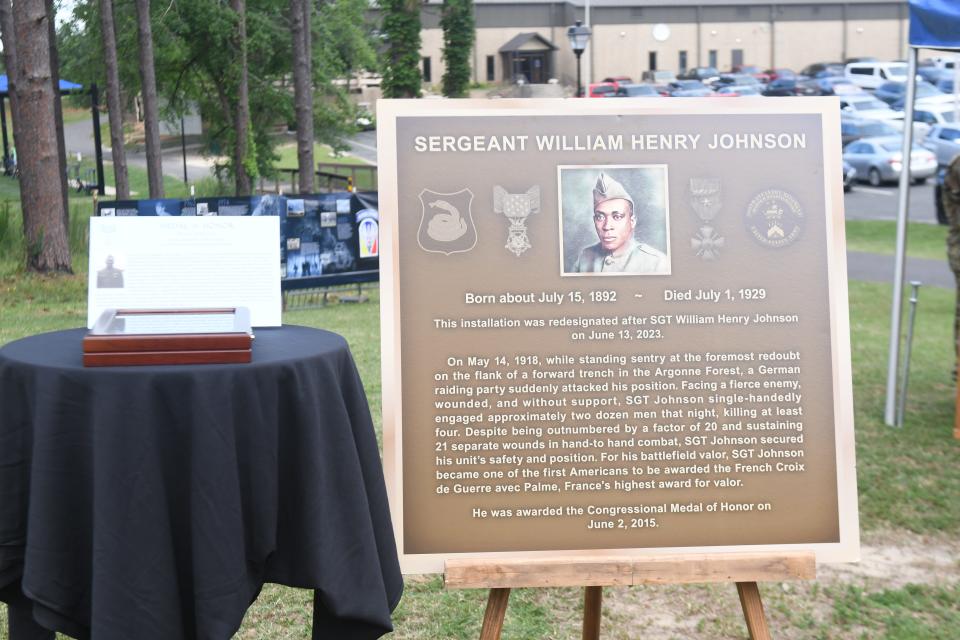Louisiana Army base renamed for Black World War I soldier
- Oops!Something went wrong.Please try again later.
FORT JOHNSON - Linda Rhodes of Pineville was overwhelmed with honor to witness the re-designation of Fort Polk to Fort Johnson in a ceremony Tuesday at the U.S. Army installation in Vernon Parish. The base was renamed for Sgt. William Henry Johnson, a Black World War I soldier and the first hero the Great War. He is finally getting a befitting recognition for service to his country that a hero like him should have gotten in life.
To have a base where soldiers come to train to protect the U.S. named after her grandfather is a big honor and more than they had ever imagined, said Tara Johnson of Toledo, Ohio.
“It’s growth," she said. "It’s growth within our services. It’s growth within our community, because now we are focusing on people, being less judgmental, regardless of the color of their skin. It is focusing on service to our country. Nothing else.”
Taylor Gamlin of Detroit, Michigan, said to have such a historical contribution noted and celebrated with the renaming of the base is such an honor for her aunt, Tara Johnson, and the whole family.
The U.S. Army base in Vernon Parish is home to the Joint Readiness Training Center and the 3rd Brigade Combat Team of the 10th Mountain Division. The Naming Commission, a federal commission led by retired Adm. Michelle Howard, recommended name changes for nine military bases named for Confederates. Fort Polk was named for Confederate Gen. Leonidas Polk, the first Episcopal Bishop of the Diocese of Louisiana. The re-designation of military installations, streets and ships is underway and must be completed by the end of the year.
Vietnam War veteran Raymond Flowers of Bastrop heard about the re-designation but didn’t attend the ceremony. He never thought the U.S. military would change the name of a military base to honor a Black serviceman.
Flowers went through basic training at Fort Polk in 1962. Due to the atmosphere at the time, he said it he probably didn’t know that the base was named for a Confederate, so it didn’t bother him that the base where he trained was named for one.
“I never thought of the former base name, because to me it’s not the name of the base in particular," said Retired Army Col. Anthony King, who is the chief financial officer for the base. "It’s the people that run the base, that operate it. So here at the Joint Readiness Training Center, now Fort Johnson, it’s all about the people currently here and the community coming as one to train soldiers.”
Barbara Dashiell-Williams of Alexandria is a Navy veteran who comes from a family with a legacy of military service. Her father, the late Charles Smith, was a World War II veteran. She is one of four of his seven children who served in the military.
"I'm so elated today," she said. "If my dad were here, he would be here today with a big smile on his face giving a big salute. This means everything for the African-Americans involved in World War I, World War II and all the other wars. The recognition is finally here."
“Personally, I believe this is a significant step forward in recognition and healing especially for the African American community,” said Daenel Vaughn-Tucker, Central Louisiana Technical Community College Director of Library Services at the main campus in Alexandria, who is an Army veteran.
Johnson's history
An article about Johnson listed on the U.S. Department of Defense website, Medal of Honor Monday: Army Sgt. Henry Johnson, states that in May 1918, Johnson fought off German soldiers attacking his position near a bridge over the Aisne River at Bois d'Hauzy in France. He suffered 21 wounds in the attack that left another soldier, Pvt. Needham Roberts, severely injured. Johnson threw grenades until he ran out and fired all the ammunition he had. When he ran out of ammunition, he charged the Germans swinging his rifle like a club. Using a bolo knife, he also fought off two Germans who tried to carry away Roberts.
Johnson became known as “Black Death" when fighting in battles. He and Roberts were the first American soldiers to be awarded the French Croix de Guerre avec, Palme, France’s highest award for valor. He was the first American hero of World War I.

When Johnson returned to the states, he was paraded around New York City. His story motivated many Black people to support the war effort.
“But despite the accolades, Sgt. William Henry Johnson was never recognized as an American veteran," said Brig. Gen. David W. Gardner, commanding general of the Joint Readiness Training Center and Fort Polk. "He never received the care for his wounds or any veterans’ benefits such as those we take for granted today.”
Johnson could not find work because he was badly injured during the war. He died destitute in 1929. He was buried with military honors in Arlington National Cemetery.
“Black soldiers have historically sacrificed so much, including their pride, dignity and honor,” said Rhodes, adding that despite segregation and discrimination, Black troops served with great distinction.
In 1996, Johnson was posthumously awarded the Purple Heart and in 2002, the Distinguished Service Cross, upgraded in 2015 to the Medal of Honor. The medal is on loan to Fort Johnson by the New York State Military Museum. It will be included in a historical exhibit about Johnson until August.
“Sgt. William Henry Johnson embodied the warrior spirit, and we are deeply honored to bear his name at the Home of Heroes,” Gardner said.
"Sgt. Johnson’s story is one that should be shared, as it is a universal story of strength, courage, and resilience. And this is a legacy that all who train at Fort Johnson will carry with them," said Vaughn-Tucker.

Jimmy Sawtelle, Chancellor of Central Louisiana Technical Community College, attended the ceremony with Vaughn-Tucker.
“The story of Sgt. Henry Johnson’s heroic bravery in World War I is beyond inspirational," Sawtelle said. "CLTCC is honored to partner with Fort Johnson, having trained hundreds of transitioning soldiers in partnership with their Soldier for Life program and partnering with companies such as Linde and our sister college SOWELA Technical Community College.”
Rhodes said President Abraham Lincoln believed in what Black soldiers could achieve despite popular opinion to the contrary during the Civil War.
“What makes me so sad is that after the war, they didn't receive what was promised to them," she said. "Their freedom. Military benefits. Medals of honor for their bravery.”
Why bases were named for Confederates
In order to get support for World War I in the South, some U.S. Army base were named after Confederate officers as a sign of reconciliation between the North and the South, according to a Department of Defense article DOD Begins Implementing Naming Commission Recommendations.
“It was also the height of the Jim Crow Laws in the South, so there was no consideration for the feelings of African Americans who had to serve at bases named after men who fought to defend slavery,” the article goes on to state.
Camp Beauregard re-designation
Camp Beauregard in Pineville will be re-designated as the Louisiana National Guard Training Center Pineville later this year, according to a press release issued by the Louisiana National Guard.
Six names were provided to the adjutant general, Maj. Gen. Keith Waddell, for consideration after the Camp Beauregard re-designation committee completed their selections.
Waddell selected the name with the top number of votes from the committee. He stated that Louisiana National Guard Training Center Pineville reflected the values of the LANG, the state of Louisiana and the United States of America.
A re-designation ceremony will be determined in this fall.
This article originally appeared on Alexandria Town Talk: Fort Polk renamed Fort Johnson; honors sacrifice of Black World War I hero

